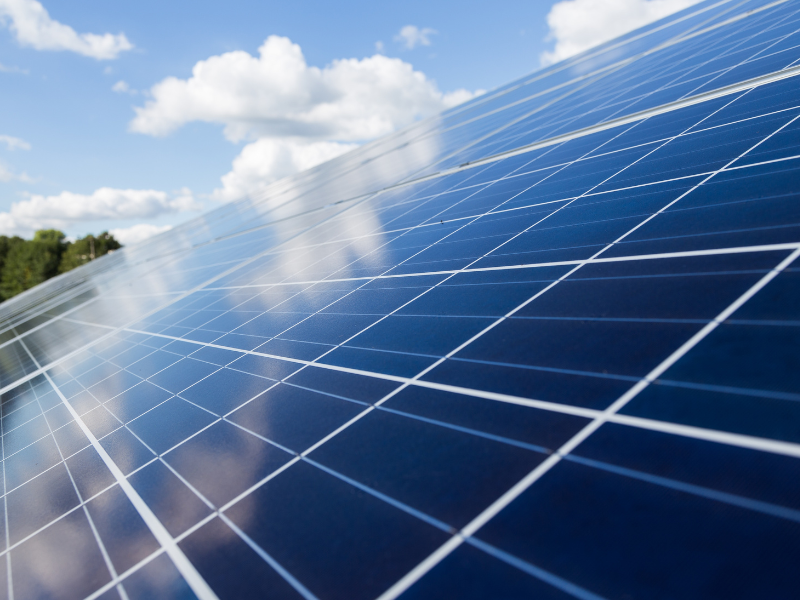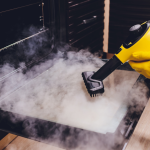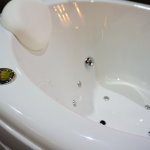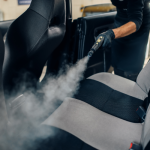Do you want to optimize performance and clean your solar panels? You don’t need to look any further! In this comprehensive guide, we will delve into the world of steam cleaning of solar panels, providing you with step-by-step instructions and invaluable tips. Discover the transformative power of steam! We will reveal to you the best techniques and tools for cleaning your solar panels. Prepare yourself to utilize the full potential of clean panels, effortlessly increase energy production.
Optimization of the efficiency of alternative energy solutions
Solar panels have become a popular choice for homeowners looking for clean and renewable energy solutions. To maintain their optimal performance and energy production, regular cleaning and maintenance are essential. In this extensive guide, we will address the benefits of using a steamer to clean solar panels. We will answer the most common questions, discuss the importance of turning off solar panels before cleaning, and recommend the best methods and cleaning agents to achieve sparklingly clean and efficient solar panels. Additionally, we will examine the impact of location on efficiency and cleaning of solar panels, limitations of pressure washers, and the importance of seeking professional help for comprehensive maintenance.
Cleaning solar panels enhances their performance and longevity
Solar panels play a key role in utilizing solar energy to power residential properties. However, over time, these panels can accumulate dust, dirt, leaves, bird droppings, and other contaminants, which can significantly hinder their operation and energy production. Regular cleaning is crucial to maintaining the efficiency and longevity of solar panels, ensuring their operation at an optimal level.
Temperature compatibility and safety
One of the key benefits of using a steamer to clean solar panels is temperature compatibility. The high heat generated by steamers is compatible with the operating temperature range of solar panels, thus ensuring that there will be no temperature shock during the cleaning process. This eliminates the risk of thermal stresses and damage to the panels. It’s worth noting that solar panels are designed to withstand temperature fluctuations, including the heat generated by steam cleaning. Panels are constructed to handle high temperatures they experience during normal operation and can tolerate the additional heat from steam cleaning without a negative impact on solar energy production.
Impact of solar blockers
Dust particles settle on the surface of solar panels, reducing the amount of sunlight that reaches the photovoltaic cells. This leads to a decrease in energy production and efficiency.
Falling leaves from nearby trees can create shadows or cover the panels, significantly impacting energy production. Additionally, decomposing leaves release moisture and organic matter, creating an ideal environment for algae growth.
Rainwater, upon evaporation, can leave mineral deposits on the surface of the panels, creating a layer that reduces light penetration. Additionally, water droplets act like magnifying lenses, intensifying sunlight and causing hot spots that can damage the panels.
Bird droppings contain corrosive substances that destroy protective coatings on solar panels. They also create a physical barrier that reduces light transmission and hinders energy production.
Steam cleaning of solar panels
Steam cleaning of solar panels is a simple process that can be carried out in a few easy steps:
Step 1: Preparation
Make sure the solar panels are cool and turned off before cleaning.
Use a soft brush on the steamer to gently remove loose contaminants and dust from the panels.
Step 2: Setting up the steamer
Fill the steamer tank with distilled water, following the manufacturer’s instructions.
Allow the steamer to heat up to the recommended temperature.
Step 3: Cleaning process
Hold the steamer nozzle a few centimeters from the panel surface. Move the nozzle in a sweeping motion across the panels, allowing high-pressure steam to dissolve and remove dirt, streaks, and other contaminants. Pay special attention to areas with stubborn stains or bird droppings.
Fortador PRO Steamer
The Fortador PRO steamer is professional cleaning equipment known for its power and versatility. It offers adjustable temperature settings and a durable design, making it ideal for safe cleaning of solar panels. Fortador Pro ensures excellent performance and reliability.
Karcher SC3 EasyFix
The Karcher SC3 EasyFix is another popular steamer with a powerful cleaning action. It has a large water tank, adjustable steam intensity, and various attachments suitable for a variety of cleaning tasks, including solar panels.
Dupray Neat steam cleaner
The Dupray Neat steam cleaner is a compact and lightweight option that delivers powerful steam for effective cleaning. It offers a quick heat-up time and a long-lasting steam flow, making it suitable for maintaining solar panels.
Cleaning Frequency
The frequency of cleaning depends on factors such as location, climate, and the accumulation of pollutants. It is generally recommended to clean solar panels every 6-12 months or as necessary. However, areas with high levels of dust, pollen, or bird droppings may require more frequent cleaning. Regular inspection helps determine the appropriate cleaning schedule.
Benefits of steam cleaning
Effective Cleaning
Steam cleaning provides thorough and effective removal of dust, leaves, water stains, and bird droppings. High-pressure steam dissolves and lifts these particles, restoring the panel surface to an optimal state.
Environmentally Friendly
Steam cleaning eliminates the need for chemical cleaning agents, which can harm the environment. Using only distilled water, steam cleaners offer a green and sustainable solution for maintaining solar panels.
Non-Abrasive
Unlike scrubbing brushes or abrasive cleaning methods, steam cleaning is non-abrasive and gentle on the panel surface. This ensures that protective coatings and delicate photovoltaic cells remain undamaged, preventing any damage that could reduce energy production.
Time and Cost Savings
Steam cleaning is a fast and effective process, allowing for time and cost savings compared to traditional cleaning methods.
Potential risks of steam cleaning
While steam cleaning is generally a safe and effective method, there are several factors to consider.
Possibility of Voiding Warranty
Steam cleaning solar panels may void warranties provided by manufacturers, potentially leaving you liable for any damage or repairs.
Damage to Certain Types of Panels
Some types of panels may be more susceptible to damage caused by high-pressure steam, leading to cracking, delamination, or reduced efficiency.
Thermal Stress
Improper use of steam cleaners, such as exposing panels to extreme temperature changes, can cause thermal stress and potentially damage solar panels.
Impact of location on solar panel cleaning
The location of your solar panels can significantly affect their cleanliness. Factors such as proximity to trees, bird activity, and local climate, can influence the frequency and intensity of required cleaning. Areas with high levels of dust, pollen, or bird droppings may require more frequent cleaning to maintain optimal performance. Similarly, regions with intense rainfall or strong winds may experience greater accumulation of debris on the panels, thereby requiring regular cleaning to ensure maximum efficiency.
Safe practices for cleaning solar panels
When handling a steam cleaner, use appropriate protective equipment, such as gloves and safety glasses, to protect yourself from steam and possible droplets.
Avoid directing steam towards yourself or others. Be cautious when using a steam cleaner to avoid contact with steam with your body or people nearby.
Beware of electrical components. Pay attention to the location of components and electrical connections in the solar panel system to avoid damaging them during cleaning.
Chemicals for cleaning solar panels
When cleaning solar panels, it is important to use safe and non-abrasive chemicals. Gentle detergents with special formulas for cleaning solar panels can be used to remove stubborn stains or deposits. However, it is important to avoid substances that leave behind a film or residue, as this can affect the panel’s further performance.
Safe cleaning chemicals include:
Isopropyl Alcohol
Effective in removing grease, oil, and dirt.
Non-Abrasive Glass Cleaners
Gentle and non-streak cleaning solutions.
Distilled Vinegar
Natural and effective in removing mineral deposits.
Unsafe cleaning chemicals to avoid include:
Ammonia-based
These can damage panels and coatings.
Abrasive cleaners or scrub brushes
These can scratch and accumulate on the panel surface, reducing efficiency.
Regular steam cleaning is a highly effective and eco-friendly method of maintaining the performance and longevity of solar panels. By using a steamer with distilled water, homeowners can effectively remove dirt, soot, and pollutants without causing damage. The high-pressure steam dissolves stubborn stains and eliminates the need for harsh chemical cleaners or cleaning agents. Additionally, turning off the solar panels before cleaning and observing safety rules ensures a safe and successful cleaning process. With steam cleaning, homeowners can optimize energy production, save time and cost, and enjoy the benefits of clean and efficient solar panels.
FAQ
What’s the best way to clean solar panels?
When it comes to cleaning solar panels, using a steam cleaner proves highly effective. Steam cleaning offers several advantages, such as the ability to dissolve and remove stubborn dirt, soot, and pollutants. High-temperature steam not only ensures thorough cleaning but also helps to eliminate potential bacteria or microorganisms on the surface of the solar panel system.
Is cleaning solar panels worth it?
Absolutely! Cleaning solar panels is a worthwhile investment for homeowners with a home solar energy system. Clean panels allow for maximum absorption of sunlight, resulting in increased solar energy production and reduced energy costs. By regularly cleaning your solar panels, you can ensure their optimal performance and maximize the return on investment.
Do you have to turn off solar panels before cleaning?
Yes, it is extremely important to turn off the solar panels before beginning the cleaning process. By switching off the solar system at the outset, you eliminate the risk of electric shock and protect yourself from potential accidents. Additionally, turning off the panels allows them to cool down, reducing the possibility of thermal stress or damage during cleaning.
What’s the best thing to clean solar panels with?
When it comes to cleaning solar panels, it’s best to use distilled water and a soft brush attachment on a steam cleaner. Distilled water helps to prevent mineral deposits on the often dirty solar panels, ensuring streak-free cleanliness. A soft brush attachment allows for gentle cleaning without causing scratches or damage to the panel surface.
Can I use dish soap to clean my solar panels?
While dish soap is effective in many different cleaning tasks, it’s not recommended for cleaning solar panels. Dish soaps can leave behind residue that decreases the performance of the panels and interferes with their operation. For optimal results, it’s best to stick with distilled water and steam cleaning methods.
What’s the best and easiest way to clean solar panels?
The best and easiest way to clean solar panels is by using a steam cleaner. Steam cleaning offers a quick and effective method of eliminating dirt, soot, and other pollutants from the panel surface. High-temperature steam dissolves grime, leaving solar panels clean and ready for maximum sunlight absorption.
Can I use a pressure washer to clean solar panels?
Using a pressure washer to clean solar panels is not recommended. Although pressure washers are effective in many other cleaning tasks, they can damage the delicate solar cells and their protective coatings. A high-pressure water stream can penetrate the panel’s seals, leading to water ingress that potentially poses electrical hazards or system damage. It’s best to avoid pressure washers and opt for safer professional cleaning methods, such as steam cleaning.




